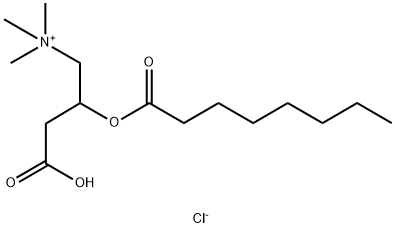OCTANOYL-DL-CARNITIN CHLORIDE
- CAS NO.:14919-35-8
- Empirical Formula: C15H30ClNO4
- Molecular Weight: 323.86
- MDL number: MFCD00063493
- SAFETY DATA SHEET (SDS)
- Update Date: 2023-06-30 15:45:59

What is OCTANOYL-DL-CARNITIN CHLORIDE?
Chemical properties
White Solid
The Uses of OCTANOYL-DL-CARNITIN CHLORIDE
A metabolite of Carnitine.
Biological Activity
(±)-octanoylcarnitine chloride is a homolog of acetylcarnitine chloride. acylcarnitines, the acetyl derivatives of carnitine, are important intermediates in lipid metabolism, required for the transport of long-chain fatty acids into mitochondria for β-oxidation and atp production, and for the removal of excess short-chain and medium-chain fatty acids. (±)-octanoylcarnitine has been shown to decrease the oxidation rate of the branched-chain 2-oxo acids 4-methyl-2-oxopentanoate and 3-methyl-2-oxobutanoate in isolated rat muscle mitochondria in the presence of carnitine, but octanoyl-l-carnitine increases oxidation of 4-methyl-2-oxopentanoate in the absence of carnitine. in addition, (±)-octanoylcarnitine, along with malate, has been used as a mitochondrial respiration substrate to evaluate the effect of creatine on the respiration rate of isolated rat cardiac fibers exposed to increasing concentrations of adp.1. zhang y, ma q, bai x. effects of dietary acetyl-l-carnitine on meat quality and lipid metabolism in arbor acres broilers. asian-australasian journal of animal sciences, 2010, 23(12): 1639-1644.2. veerkamp jh, van moerkerk ht, wagenmakers aj. interaction of short-chain and branched-chain fatty acids and their carnitine and coa esters and of various metabolites and agents with branched-chain 2-oxo acid oxidation in rat muscle and liver mitochondria. international journal of biochemistry, 1985, 17(9): 967-974.3. toleikis a, trumbeckaite s, liobikas j, et al. fatty acid oxidation and mitochondrial morphology changes as key modulators of the affinity for adp in rat heart mitochondria. cells, 2020, 9(2): 340.
storage
Desiccate at RT
Properties of OCTANOYL-DL-CARNITIN CHLORIDE
| Melting point: | 178-180°C |
| storage temp. | -20°C Freezer, Under Inert Atmosphere |
| solubility | Methanol (Slightly), Water (Slightly) |
| form | Solid |
| color | White |
| Stability: | Hygroscopic |
Safety information for OCTANOYL-DL-CARNITIN CHLORIDE
Computed Descriptors for OCTANOYL-DL-CARNITIN CHLORIDE
New Products
4-AMINO-TETRAHYDRO-PYRAN-4-CARBOXYLIC ACID HCL 4-(Dimethylamino)tetrahydro-2H-pyran-4-carbonitrile 4-AMINO-TETRAHYDRO-PYRAN-4-CARBOXYLIC ACID 4-Aminotetrahydropyran-4-carbonitrile Hydrochloride (R)-3-Aminobutanenitrile Hydrochloride 5-Bromo-2-nitropyridine Nimesulide BP Aceclofenac IP/BP/EP Diclofenac Sodium IP/BP/EP/USP Mefenamic Acid IP/BP/EP/USP Ornidazole IP Diclofenac Potassium 3-Bromopyrazole (3aR,4R,5R,6aS)-hexahydro-5-Triethyl silyloxy-4-((E)-3-oxo-5-phenylpent-1- enyl)cyclopenta[b]furan-2-one. 1-Chlorocarbonyl-4-piperidinopiperidine 1-Bromo-4-phenyl-2-Butanone 4-Amino-2-fluoro-N-methylbenzamide 1,1'-Carbonyldiimidazole SODIUM AAS SOLUTION ZINC AAS SOLUTION BUFFER SOLUTION PH 10.0(BORATE) GOOCH CRUCIBLE SINTERED AQUANIL 5 BERYLLIUM AAS SOLUTIONRelated products of tetrahydrofuran
You may like
-
![Dimethyl [2-oxo-3-[3-(trifluoromethyl)phenoxy]propyl]phosphonate 99%](https://img.chemicalbook.in//Content/image/CP5.jpg) Dimethyl [2-oxo-3-[3-(trifluoromethyl)phenoxy]propyl]phosphonate 99%View Details
Dimethyl [2-oxo-3-[3-(trifluoromethyl)phenoxy]propyl]phosphonate 99%View Details
54094-19-8 -
 85-81-4 99%View Details
85-81-4 99%View Details
85-81-4 -
 Cyclopentane carboxxylic acid 3400-45-1 99%View Details
Cyclopentane carboxxylic acid 3400-45-1 99%View Details
3400-45-1 -
![208111-98-2 (3aR,4R,5R,6aS)-5-(Benzoyloxy)hexahydro-4-[(1E)-3-oxo-4-[3-(trifluoromethyl)phenoxy]-1-buten- 1-yl]-2H-cyclopenta[b]furan-2-one 99%](https://img.chemicalbook.in//Content/image/CP5.jpg) 208111-98-2 (3aR,4R,5R,6aS)-5-(Benzoyloxy)hexahydro-4-[(1E)-3-oxo-4-[3-(trifluoromethyl)phenoxy]-1-buten- 1-yl]-2H-cyclopenta[b]furan-2-one 99%View Details
208111-98-2 (3aR,4R,5R,6aS)-5-(Benzoyloxy)hexahydro-4-[(1E)-3-oxo-4-[3-(trifluoromethyl)phenoxy]-1-buten- 1-yl]-2H-cyclopenta[b]furan-2-one 99%View Details
208111-98-2 -
 2033-24-1 99%View Details
2033-24-1 99%View Details
2033-24-1 -
 Meldrums acid 2033-24-1 99%View Details
Meldrums acid 2033-24-1 99%View Details
2033-24-1 -
 Cyaclopentane carboxylic acid 99%View Details
Cyaclopentane carboxylic acid 99%View Details
3400-45-1 -
 2-Aminopyridine 504-29-0 99%View Details
2-Aminopyridine 504-29-0 99%View Details
504-29-0
